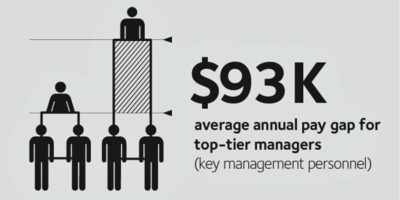Dianah Worman is co-director of Inclusive Talent – a diversity and talent management research, consultancy and facilitation organisation. She is also a diversity and inclusion adviser at the CIPD.

“…flexible working is essential, so up-skilling peoples’ abilities to work efficiently and effectively on a flexible basis will be pivotal to the future of work, by making work better for everyone…”
Measuring the gender pay gap in order to close it
Identifying gender pay gaps will help organisations to spot where talent is haemorrhaging out of the business and threatening economic success. Pay gaps will give clues about where and how to adopt solutions to strengthen and build a diverse talent pipeline to ensure competitiveness and long term survival. They will help to improve retention rates and effective, inclusive access to training and development to build workforce skills and capacity.

Stop writing off capable women
Recent announcements by the Chancellor to make £5 million available to support paid internships for professional women returning to work after an extended career break will encourage top talent back into work. It will signal the importance to business not to write-off capable women who cut the mustard at work before taking time out.
It will help to counter the stereotypical thinking that lack of recent job currency rules you out as a viable candidate for holding down a job in future because you won’t be able to hit the ground running. This is a short-sighted outlook that compromises access to talent and skills.
Diverse interventions to widen talent pools
Many future-focused organisations know this and are adopting diverse interventions to widen their talent pools. For instance, there are now many returnships and higher paid internships in the finance sector, for example.

While such returner programmes for experienced people might not be 21st century innovations, they fit the bill for opening up access to diverse talent that might be neglected by default. There is an imperative to engage more mature workers because of ageing demographics.
As a nation, we need to help improve economic independence for women and men who may have elected to leave the workforce for extended periods of time for diverse reasons. Many more women who may have had extended periods of time not working when they were younger are now in work at age 70, for example.
Inclusivity needs to become business as usual
While improving gender diversity in business continues to be a key topic, increasingly it is being recognised that what works well for women can also work well for everyone and that being inclusive should become business as usual. PwC has introduced a Flexible Talent Network in recognition of the importance of flexibility in delivery top drawer professional services to customers and clients.
Shifting to a new culture based on mutual trust and inclusive leadership
Flexible working cultures require a management style that moves away managing presenteism and how long employees spend at work to one focused on outputs and the delivery of objectives in ways that add value to business and customer service. Such cultures must be built on mutual trust and inclusive leadership to foster high performance.
Managers need to be guided about the importance of flexibility and enabled to foster appropriate solutions to meet the needs of people and the business rather than blocking change. All employees need to behave responsibly to make flexible ways of working a success as in this way everyone benefits. When a solution loses its sell-by-date a new solution should be adopted to keep pace with change.
The new world of work
The world of work is changing fast and flexibility is central to these changes being successful. More people are working in the gig economy on projects and initiatives that depend on sourcing and putting together relevantly skilled people into teams to deliver the objectives and aims of an initiative by a due target date for example, or to serve a key purpose.

In conclusion, flexible working is essential, so up-skilling peoples’ abilities to work efficiently and effectively on a flexible basis will be pivotal to the future of work, by making work better for everyone. Personal autonomy and wellbeing is dependent on time sovereignty. We can all expect to hear more about this concept over the coming years as the workplace shifts further and people continue to seek out better balance between their personal and professional lives.
http://www.inclusivetalent.co.uk/
https://twitter.com/inclusivetal
dianah.worman@inclusivetalent.co.uk
https://twitter.com/dianahworman





